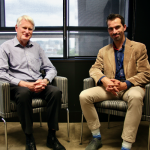Multiple sclerosis (MS) is a disease that affects the brain and spinal cord, causing inflammation and long-term nerve damage.
While treatments have improved over the past 30 years, they mainly target inflammation, and there are still no effective treatments for the slow, ongoing damage that leads to disability.
A major challenge in MS care is detecting subtle changes in movement and thinking ability early, as traditional clinical assessments miss early signs of progression. This is particularly important for older people with MS, who often experience a more progressive form of the disease and are at higher risk of disability.
This project explored new ways to monitor MS progression using digital tools, including an iPad-based test called the MS Performance Test (MSPT). The MSPT measures patient-reported disability, thinking speed, and hand function to detect early signs of decline.
While patient-reported measures in the MSPT reflected quality of life and symptoms like depression and anxiety, they did not always align with standard neurological tests.
Dr Foong found that the MSPT could also identify subgroups of people with MS at risk of worsening cognitive and physical abilities.
The team also explored the effectiveness of disease-modifying therapies in older people with MS.
Using real-world data, they found that highly effective treatments, such as ocrelizumab, significantly reduced relapses in older patients compared to lower-efficacy treatments.
However, these treatments did not appear to slow long-term disability progression.
Overall, this research supports the use of digital tools to improve early detection of MS progression and highlights the need for better treatments in older people with MS.
Tools like the MSPT could allow for remote monitoring of MS. This could help reduce the need for in-person reviews for the oversubscribed health system.
The team collaborated with the MSBase registry and the IMPROVE MS study for this project. They presented the findings at multiple national and international conferences, including an oral presentation at the ECTRIMS 2023 conference.
Updated: 31 March 2025
$30,000
2022
3 years
Current project




